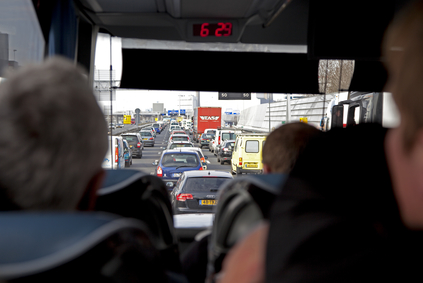Dutch cities join call for EU help on traffic fine payments
Claudia Delpero
Representatives of 20 European cities, including Amsterdam, Rotterdam, The Hague and Utrecht, have written to the European parliament calling for help in enforcing traffic regulations on European drivers.
The letter focuses on congestion charges and low-emission zones, which can easily be escaped by drivers from other EU countries, but have been left out from new measures in discussion.
The European parliament’s transport and tourism committee is currently discussing an update of the EU Cross-Border Enforcement Directive, which aims to ensure that fines handed out to drivers from other EU countries are paid.
The directive refers to offences such as dangerous overtaking, dangerous parking, driving in the wrong direction, failure to keep distances and overloaded vehicles. But it does not mention so-called urban vehicle access regulations (UVARs), such as congestion charges and low-emission zone restrictions.
The signatories are now calling on MEPs to include UVARs in the text during a vote planned for November 29. This would allow EU countries and cities to exchange information and enforce sanctions to make sure fines are paid.
At present, foreign drivers can easily avoid fines for local traffic violations as their enforcement is only possible between countries that have signed a bilateral agreement.
The letter notes in Amsterdam alone, “35% of the trucks entering the city carry a foreign licence plate for which the vehicle ownership cannot be verified. This situation prevents the adequate enforcement of a ban on trucks above 7.5 tonnes.”
Beyond the loss of revenues, cities representatives fear the unequal treatment between national and foreign drivers.
“Inequality risks fuelling opposition to measures that are otherwise designed to ensure cleaner air, reduce C02 emissions and create more liveable neighbourhoods,” the letter says. “We must treat all vehicles and their drivers equally, regardless of their European origin.”
The update of the directive is part of a series of EU measures including new driving licence rules.
According to the Commission, some 40% of the 6.3 million traffic offences involving a ‘foreign’ car were not paid in 2019 because either the driver was not identified or because the payment was not enforced.
Thank you for donating to DutchNews.nl.
We could not provide the Dutch News service, and keep it free of charge, without the generous support of our readers. Your donations allow us to report on issues you tell us matter, and provide you with a summary of the most important Dutch news each day.
Make a donation